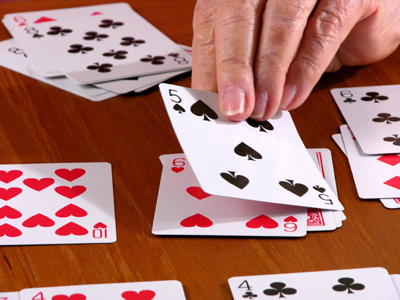Now let’s learn a little about each.
PARTICIPLE
First we have the participle which is created by adding to the root word of a verb. For example, to play becomes playing, or to walk becomes walked. The verbals have changed the verb by adding either an “ing,” an “ed” or the past tense ending of a word such as to go would be “went.” The participle can then act as either the main verb in a verb phrase or it can act as an adjective to describe or modify a noun or pronoun. For example, “The fisherman caught a fish” shows the participle as the main verb. However, if written as, “The caught fish struggled,” the participle becomes an adjective describing what kind of a fish it was, i.e., “caught.”
A participle is always part of a phrase. Looking at the above examples, “The fisherman caught” is one phrase while “The caught fish” is another phrase. Each of these are therefore, a participle phrase.
In a complex sentence, if the participle phrase comes at the beginning of the sentence, it is always followed by a comma. For example, “Running for office, the candidates gave their best speeches.”
GERUND
A gerund is a verb that can act as a noun. It is formed by adding “ing” to a verb. Once the “ing” has been added, the word can act as a subject, direct object, the object of a preposition or a predicate noun. For example, in the sentence, “Skating is my favorite activity,” the word “skating” is the direct object. Now if we rework the sentence to read, “My favorite activity is skating,” skating then acts as the predicate noun.
[Note: A word that ends in “ing” can either be a verb, a participle or a gerund. It all depends upon how and where the word is being used.]
How do you determine if the word is a verb, a participle or a gerund? First find the word that is the simple subject and then what the simple verb is. Then see how the subject and verb are being used. If the verb is being used as a noun, then it is a gerund. If it is being used as an adjective, then it is a participle.
Let’s look at the following three sentences.
Kelly and Angie are swimming. (In this case, “swimming” is a simple verb.)
Kelly and Angie enjoy swimming. (In this case, “swimming” is shown as a noun and is, therefore, a gerund.)
The swimming pool they go to is always crowded. (In this case, “swimming” is being used as an adjective to describe what kind of pool it is so it is a participle.)
INFINITIVES
An infinitive is a verb that has the word “to” in front of it. It points to the root verb. For example, “He likes to run after school.” Another example of an infinitive is, “She hates to play the piano.”
An infinitive can act as a noun (To interfere would cause more trouble.), an adjective (he had a car to rent [to rent describes the car]) or as an adverb (everyone stopped to laugh [to laugh modifies stopped as it tells why everyone stopped]).








